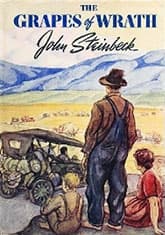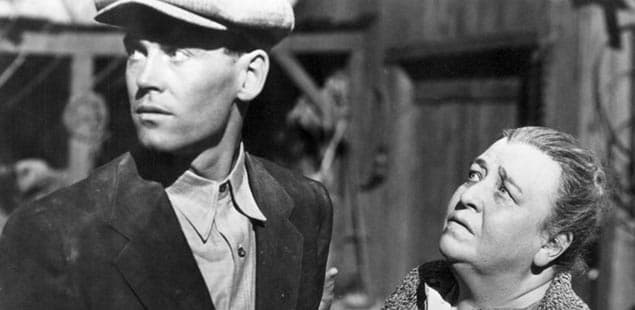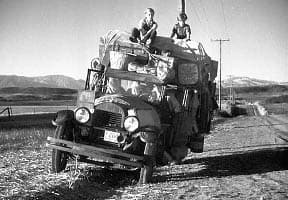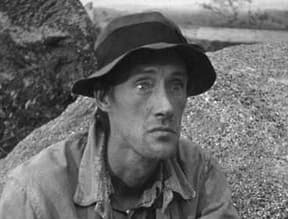The Grapes of Wrath
Critique • Quotes • At the movies
 First edition
First editionFirst publication
1939
Literature form
Novel
Genre
Literary
Writing language
English
Author's country
United States
Length
Approx. 176,000 words

Tom (Henry Fonda) and Ma Joad (Jane Darwell) confront a grim future in 1940 film.
Hope for we the people
The Grapes of Wrath (1940): Film, 129 minutes; director John Ford; writer Nunnally Johnson; featuring Henry Fonda, Jane Darwell, John Carradine, Russell Simpson
Miracle of miracles. Hollywood takes a truly great book and creates a truly great and faithful movie from it.
Some critics have noted The Grapes of Wrath film of 1940 softens the political protest of The Grapes of Wrath novel. But not by much. In some ways, the black-and-white cinematic version is actually harsher, particularly in its visual depiction of the life of the itinerant families in camps.
Much of the credit must go to the great screenwriter Nunnally Johnson. The Grapes of Wrath film, which he also co-produced, tells the Depression-era story of the Okies—and the Joad family in particular—nearly as completely and as powerfully as the novel. If it's a miracle, it's a miracle of compression. All the emotional high and low points are delivered, albeit with a condensed plot, but so well that a recent reader of the novel has to think hard to recall the little bits of narrative that have been dropped. With one big exception at the end which we'll get to.
The major parts of the novel that have been skipped are, of course, those voice-of-God interludes in which author Steinbeck goes on about the land, the weather, the people and their westward migration. It's enlightening and moving on the printed page but impossible to film. A lesser screenwriter and director might have used a narrator to present some of that.
But Johnson and director John Ford let the camera and on-screen characters give us a sense of all background information. Ford is brilliant at using long shots of the individual-dwarfing landscape of the American southwest to suggest a range of perspectives from depressing to awe-inspiring, then moving in with unorthodox (for the time) medium-range and close-up compositions to show the characters' relationships to their surroundings and to each other.
And such characters. Henry Fonda seems to have been born to play Tom Joad, which may be surprising to those who know him for his warmer, All-American nice guy roles. But there's a certain steely-eyed quality about him that makes believable Joad's gradual transformation from a naive country bumpkin to an awakening rebel, if not outright revolutionary.
Complementing him is John Carradine, born also to play the lapsed preacher Casy: inwardly tortured, crushed by his failures to help his flock, but always exuberant, and then leaping into the fray when he finally finds his calling, showing Tom the way forward.
And the parents. Jane Darwell deservedly won an Academy award for playing Ma Joad. True, she has many of the most moving scenes and the best lines in the film, sometimes verging on sentimentality, but she delivers them so honestly that it becomes impossible to go back to the book without seeing and hearing Darwell as the long-suffering by strong-willed mother. Helping both her and Fonda in many scenes is the hard-faced character actor Russell Simpson, who as Pa Joad can express in a simple stare a lifetime of dashed hopes.
But the movie, like the book, is an ensemble piece and a legion of actors bring to life the entire Joad family, their fellow travellers and the exploiters they run into at every step.
New ending
The only major disappointment in the film for the reader, apart from the necessary brevity of any movie, may be the ending. It's a great ending, even a famous one. But the book's conclusion, controversial at the time, was also a great one.
Film studios of the day would not have allowed the depiction of breastfeeding, let alone the breastfeeding of a grown man. So Ford planned to end the film with Tom's leaving, having him walk off under a vast, darkly streaked sky to signify the struggles to come.
But producer Darryl F. Zanuck had an additional scene tacked on showing the rest of the family driving on, employing Ma Joad's "we're the people" speech, which takes place earlier in the book but works perfectly here (and may have been the final touch to win Ford an Academy award).
The several post-Tom chapters in the book, showing the devastated family reaching even lower lows, are dropped. Probably a wise decision, as the point has already been drilled in. We need something at the end to reflect Steinbeck's own dogged faith that the people will overcome whatever's thrown up against them—and we get it in spades.
— Eric



